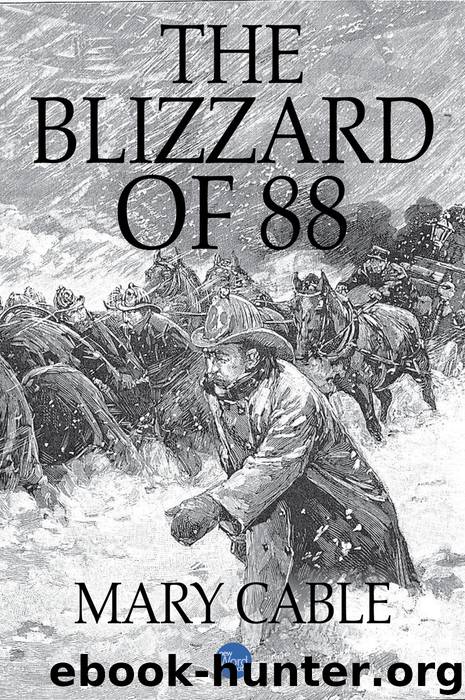The Blizzard of 88 by Mary Cable

Author:Mary Cable [Mary Cable]
Language: eng
Format: epub
Tags: History/United States/19th Century
ISBN: 9781640190962
Publisher: New Word City, Inc.
Published: 2017-09-19T16:00:00+00:00
“New Yorkers,” wrote The New York Times, “are the best-natured people in the world.”
There was much good humor shown through all the blizzard’s discomforts and dangers, and much genuine kindness toward strangers and chivalry toward women. Fifty years later, when old-timers recalled the Blizzard of 88, this theme was recurrent: “Those were the happy days!” one of the “Blizzard Men” said. “No war, no enemies, and no race prejudice - everyone was a good neighbor and democratic.”
But how well had the Blizzard Man remembered? It is true that the exigencies of the storm prompted suppression of some standard prejudices of class, race, and sex, but those prejudices remained, nonetheless. Italians, Irish, Germans, Jews, and countless other groups who engaged in the scramble for a better life often got in one another’s way, while the dominant Anglo-Saxons were likely to frown on all of them. Blacks were the lowest on this totem pole, and they are so seldom mentioned in the annals of the blizzard that one wonders if they were invisible. One blizzard veteran remembered being pulled from a drift by “a young colored chap,” and blacks manned some of the ladders that people used to escape from stalled el trains. But how many there were, or what they did for a living, is nowhere recorded. People criticized them for charging too much for the ladder service, but whether it was ten cents, twenty-five, or fifty was not recorded either. Blacks turned up to carry bags, fetch sandwiches, run after blown-away hats - and quickly disappeared again. The World spoke of the “colored squatters” who lived in Hackensack Meadows. Late Monday night, their bonfires could be seen, burning in the huge expanse of snow. But how they lived, how they ate and kept warm, how they felt about anything, or what their names were - all that is gone with the ashes of the bonfires.
Yet good nature, helpfulness, and sometimes true heroism were in marked evidence. A janitor, headed for work downtown, helped a frail woman schoolteacher to the el platform: “The wind nearly carried both of us away.” A Macy’s floorwalker, John Schneider, noticed an old woman cowering in a Fourteenth Street vestibule. He spoke to her and learned that she had been put out of her furnished room that morning for nonpayment of rent. Schneider risked being late for work and took her to a home for the indigent. And a young dry-goods clerk carried a fellow worker, who had become ill and was unable to walk, all the way from Fulton Street to the ferry station at the Battery. It took him three hours, carrying the man piggyback along the slippery sidewalks. Still another young man found a bewildered shopgirl wandering disoriented on Bleecker Street, and escorted her to her home, some eighty-five blocks away. Her mother, when they arrived about midnight, fainted with joy and the girl “smothered him with kisses.”
The master of a cotton schooner from Savannah had seen the barometer dropping and hurried to make port at the South Street docks.
Download
This site does not store any files on its server. We only index and link to content provided by other sites. Please contact the content providers to delete copyright contents if any and email us, we'll remove relevant links or contents immediately.
How to Do Nothing by Jenny Odell(2657)
A Forest Journey by John Perlin(2597)
The Plant Messiah by Carlos Magdalena(2468)
Babylon's Ark by Lawrence Anthony(2081)
Energy Myths and Realities by Vaclav Smil(2075)
The ESV Study Bible by Crossway Bibles(1987)
Abbey in America by Murray John A(1814)
Fatal Storm by Rob Mundle(1795)
Witness Tree by Lynda V. Mapes(1700)
Shadows on the Gulf by Rowan Jacobsen(1522)
Client Earth by James Thornton(1514)
Brokeback Mountain by Annie Proulx(1478)
Coming Back to Life by Joanna Macy(1472)
Water Rights and the Environment in the United States by John Burch(1420)
Cosmos by Carl Sagan(1411)
Ten Billion by Stephen Emmott(1389)
Mycelium Running: How Mushrooms Can Help Save the World by Paul Stamets(1299)
The overachievers by Robbins Alexandra(1290)
The Uninhabitable Earth by David Wallace-Wells;(1199)
